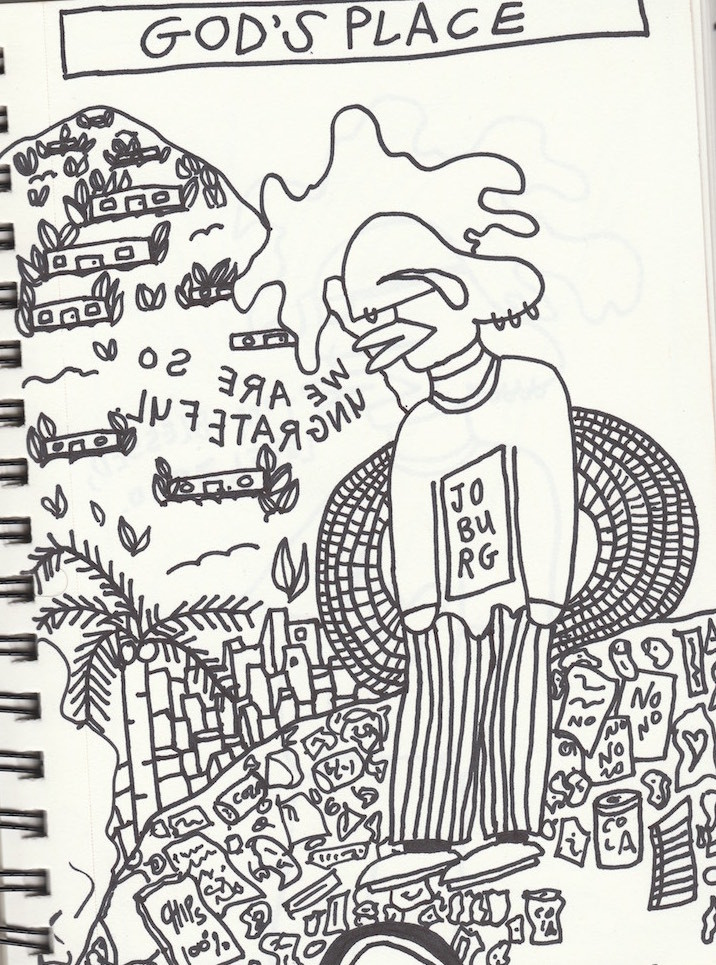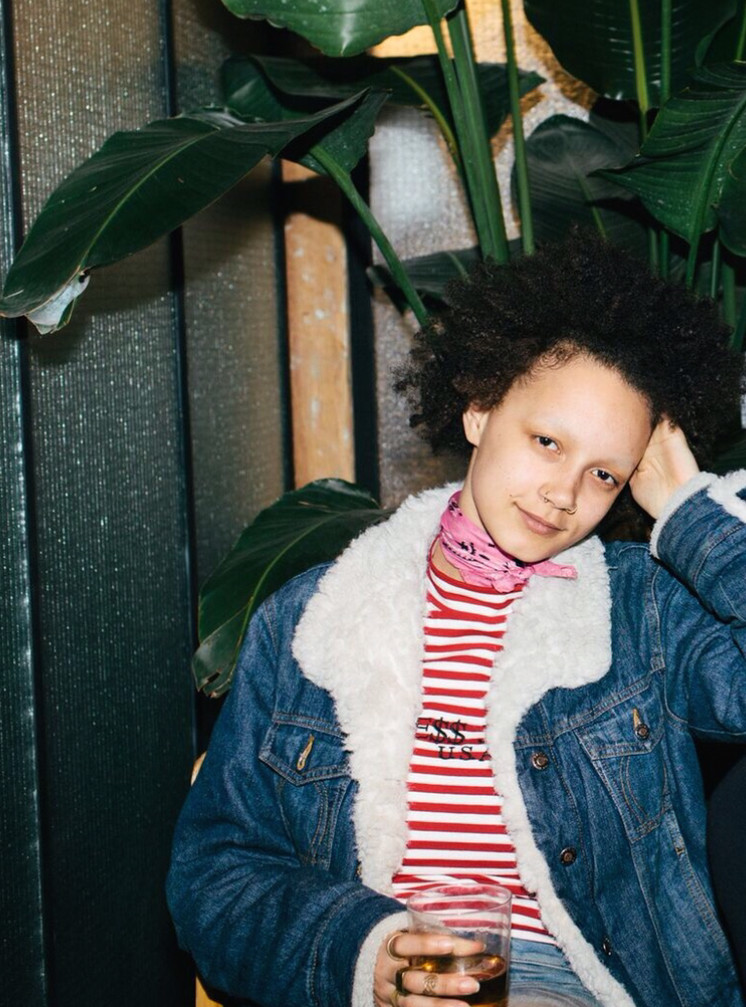Corey Wash’s Instagram bio reads, “I draw stuff and go on adventures,” which is a good description of her life over the past two weeks, if not a bit of an understatement. The model, visual artist, and steadfast feminist has just landed in New York from Johannesburg when we called her to chat. This latest adventure was the result of a close friendship with Little Simz, the North London rapper who was previously in South Africa — specifically Cape Town, where she still has family — for a 10-day activism rally that followed the #feesmustfall student protests and the release of her own powerful response track “Gratitude”.
The Johannesburg trip also had a profound meaning for Corey, who had never been to South Africa before. For the past few years she has been responding to sociopolitical issues through a cartoon character called Willoughby, who is a recurring presence on her Instagram page along with Simz, Bibi Bourelly, and her boyfriend, producer Melo-X. Corey has also had successful exhibitions during Art Basel Miami last year and Bibi Bourelly’s Society Sessions in June. In Johannesburg, Willoughby — a longtime advocate of Black Lives Matter and a woman’s right to have body hair — became a mouthpiece for Corey’s reaction to the suburbs affected by forced migration and the cavernous gap between rich and poor. We asked the artist to share her visual diary from the JBurg adventure and discuss being a woman of color on the internet. One of Corey’s most recent creative ventures is recommending books to the men who feel it’s their place to question her hair decisions — whether head, armpit, or eyebrow-related — on Instagram.
How was your time in Johannesburg?
It was amazing. It was my first time in South Africa. We were there for about four days. We were pretty much just going to different places around the city and eating local food with local people.Johannesburg had a very strong sense of community. When I was down there I saw a lot of families together and a lot of political things that were happening. Everything ties in with my artwork — I like to reflect the times and talk about live experiences.
Last year Little Simz recorded the track “Gratitude” in response to the government’s decision to raise student fees. Was there anything you saw in South Africa that had an impact on your own art?
Yeah, we went to a JBurg neighborhood called Yeoville — pretty much the slums of South Africa. It used to be a suburb, then immigrants and people from other parts of South Africa started migrating there and bringing crime to the area. We were in Yeoville at this place called God’s Place — it’s where people come to do prayer and get rid of any evil or bad spirits. It’s also where a lot of homeless people live. It was pretty surreal to be there. When you’re actually standing and overlooking God’s Place you can see some of the richer areas, the mansions, you can see a stadium. It’s pretty crazy to see that, standing on top of fields of trash but overlooking wealth. It made me think about how big the gap is between rich and poor. It was really eye-opening. We take a lot of things for granted.

Your work touches on a lot of sociopolitical issues, whether it’s Black Lives Matter, feminism, or the social media generation’s questionable priorities. Has this always been a theme in your illustrations?
When I decided that I wanted to become an artist, I knew that I wanted to express myself but I didn’t know how. Once I got the signature style of cartoons that I use now, I started talking about my experiences, like hanging out with friends and being a struggling artist. But then a family member died and all these heavy things were happening, and I felt like I wasn’t using my platform the way that I could be. I was seeing the news and how many people were being killed, whether in Syria or in the U.S. I thought, “Let me stop just talking about smoking weed with my friends and going to parties — let me start talking about why our voices matter, or why women shouldn’t have to conform to men’s standards, or why you can be 21 or 18 and do whatever you want to do.” I felt like I had to use my voice for something that’s bigger than me.
Related: See Corey in Harley Weir’s The Female Gaze Issue shoot, with cover star Adwoa Aboah
Why do you think that lighthearted cartoon characters like Willoughby are a good way to address those big issues?
For the most part, people love it when they can laugh at something. It’s more digestible than writing a long essay. When I go on my rants I’m usually just talking directly to one person, and those views I usually end up translating into a cartoon. So if I’m arguing with a guy on Instagram or Twitter, I’m like, “I need to draw a cartoon like this because there are probably more guys out there like him.” If I present it as a cartoon it draws people in. It didn’t feel forced for me, and it was easier for me to introduce more serious messages into my work because people were already familiar with the Willoughby character.

You seem to have a close circle of female friends, most of whom are musicians. Is there a reason you vibe so well with those girls?
Yeah, we all met through mutual friends. Nothing was fabricated, nothing was over Instagram. Bibi I met through some friends, Simz I met through my boyfriend who’s a musician, and Kari Faux I met through mutual friends as well. I’m really grateful to have those girls around me. They have such strong, empowering voices and are always very truthful. I feel like it’s important to keep these people around me and keep me focused on what I’m doing.

What work did you show for the Society Sessions event with Bibi Bourelly?
I showed four pieces, and I also did a lot of drawings. I would start drawing and have someone finish it, or I would just do a custom drawing for somebody. I took a little jab at men for one of them — it was a drawing of your average 2016 guy with a cup of lean, three blunts, and a stack of money in his hand, but he doesn’t have an open mind. His mind is very closed. In another drawing I was just asking why society has a need to negatively judge people before giving them praise or any kind of positive reinforcement. Why is it so important for you to judge me when you should instead by trying to better yourself? I always like to ask that question. Another drawing was about me not understanding why people can’t let me live. I like to go against societal norms, whether it’s shaving off my eyebrows or letting my body hair grow or not getting my hair done in years. I like to draw about the backlash I get for that.
Do you get negative comments on Instagram for doing those things?
Oh yeah. Sometimes I’ll post a photo or even a drawing and people will tell me I should shave or comment on my eyebrows or what I’m wearing. I find myself in constant battles. I remember a few weeks ago my boyfriend posted a picture of me, and I had my arm up. This one guy commented, “She could have at least shaved her pits.” I was like, “Oh, I’m sorry — I forgot that I was supposed to meet your standards instead of focusing on my career.” I told him that instead of teasing me he should read this book. I decided that every time someone had something negative to say I would give them a book recommendation. People definitely take it in a weird way, but there’s always a chance they might actually check out the book.
Credits
Text Hannah Ongley
